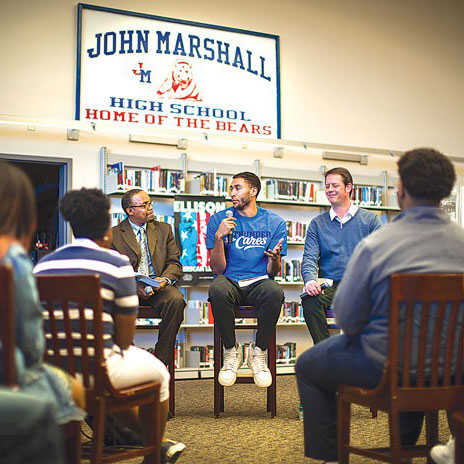Writers, though mortal, tend to live on through their works. For Oklahoma-born literary icon Ralph Ellison, channels to posterity include the magnum opus Invisible Man, several essay collections and the posthumous novel Juneteenth. In addition to his written works, however, Ellison’s legacy continues due to a group of thinkers, professionals and self-professed “Ellisonians” who, in 2014, created Ralph Ellison Foundation.
As it enters its fourth year, the foundation’s activities are a mixture of continuation and innovation, with both short- and long-term plans. On Feb. 24, the foundation hosted its annual fundraising gala at Oklahoma History Center.
Other initiatives, such as the In the Light Bulb Room series, enabled by a grant from Oklahoma Humanities and the National Endowment for the Humanities, will continue this year. The series aims at creating dialogue and room for difficult-to-discuss issues of race, identity and culture.
“The concept really comes out of the idea of creating a space where one can be enlightened, can be illuminated, but also a healthy space where you can voice your opinions without retribution,” said Michael Owens, the foundation’s executive director.
Ralph Ellison Foundation hosted four In the Light Bulb Room conversations in 2017 (Stillwater, Tulsa, Norman and Oklahoma City). Owens said those events have fostered honest dialogue and given the foundation insight into its role moving forward.
“It was one of the most honest conversations I think I’ve ever been in,” Owens said of the Oct. 26 In the Light Bulb Room conversation in Norman, which focused on change and race relations in the town. “A lot of work goes into how you facilitate the conversation, which is a learning skill, and this is something that the foundation wants to hopefully do, moving forward: to teach organizations, to teach professionals, whether it’s teachers or CEOs, how to have these conversations.”
In the Light Bulb Room conversations will resume sometime in March, Owens said, with the added goal of creating a youth-focused offshoot of the series.
Expanding futures
The foundation has multiple ongoing initiatives meant to reach school-age children. One, started in Feb. 2017, displays posters of Ellison at various elementary schools, while another provides free high school curriculum resources for teachers discussing Ellison’s Flying Home and Other Stories. Regular reading clinics at Ralph Ellison Library and creative writing workshops featuring local writers and speakers will continue as part of the foundation’s 2018 programming.
Owens said that many minority children and those from underserved communities don’t always have the opportunity to talk or think about their futures.
“How can we help them talk about their past? How can we help them understand their present and then focus on the future?” Owens asked.
In order to help young people visualize these questions, the foundation created a mural project. Composed of a two-sided wooden display with framed spaces, the project allows for students to express their ambitions through visual media. The traveling display can move between schools.
Owens said the mural project is designed to dovetail with photography and art classes so students can document images of their surroundings in relation to past, present and future. When brought together in the display, the student-created images represent both individual and collective narratives, Owens said.
“These are their ideas and thoughts,” Owens said. “Where you are is not where you will end up. There is a future for you. What is that future?”
A January event brought Oklahoma City Thunder player Josh Huestis to John Marshall Mid-High School to discuss Invisible Man, showing the wide appeal of Ellison’s work. The event bridged the divide between Ellison’s long-held academic appeal and the foundation’s aim of promoting his works to a wider audience.
“My goal has been to popularize Ellison and bring him into pop culture,” Owens said. “Look at what this enormous writer, this great person, has done. He’s still relevant in culture.”
As pop culture continues to absorb and adapt Ellison’s work through projects such as Hulu’s forthcoming Invisible Man miniseries, Ralph Ellison Foundation hopes to continue the appeal in Oklahoma inside and outside the classroom.
“We have plenty of intellectual capital here,” Owens said. “The foundation is helping to bring attention to that intellectual capital.”
As part of its annual awards, the foundation honored Dr. Stanley Evans, assistant dean at the University of Oklahoma College of Law, and Councilwoman Breea Clark, who represents Norman’s Ward 6. Owens said the foundation’s awards will expand to include youth who have done exceptional work in the community.
Although 2018 has only just begun, the foundation is already looking well into next year. A long-term goal of the foundation — to consolidate operations into one space — is taking form through a partnership with Oklahoma Contemporary Arts Center. Owens said that the proposed headquarters would be on Broadway Avenue in Oklahoma City and is tentatively slated to open sometime in fall 2019.
“When you value your greats, you show it,” Owens said. “I think we’ll get there simply because he deserves to be there. Ellison did all the work. All we have to do is continue to highlight what he did, to … make that relevant in the lives of people today and to use his legacy in a way that improves Oklahoma, the culture, the people.”
Visit ralphellisonfoundation.org.
Originally published in Oklahoma Gazette
